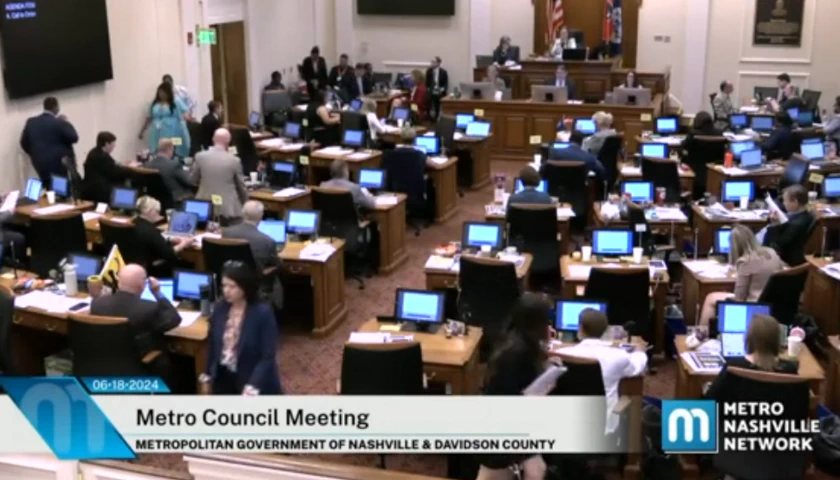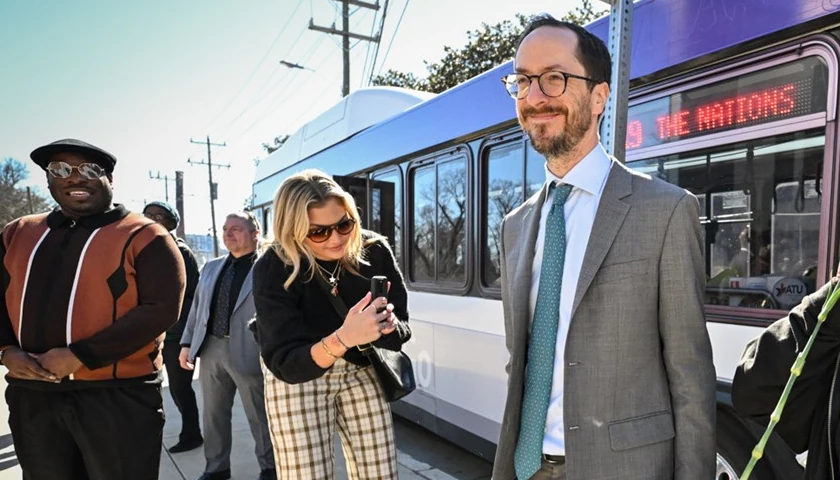The Metro Nashville Council passed Mayor Freddie O’Connell’s multi billion-dollar transit plan on its first reading during Tuesday’s meeting.
O’Connell unveiled his multi-billion dollar transit plan, “Choose How You Move: An All-Access Pass to Sidewalks, Signals, Service, and Safety,” in April.
The mayor’s plan would be funded by a half-cent increase in the city’s sales tax to construct miles of new sidewalks, bus stops, transit centers, parking facilities, and upgraded traffic signals around Nashville.
While the plan’s price was originally priced at $3.1 billion, an independent audit by the accounting firm KraftCPAs has since shown that the mayor’s plan will swell to $6.93 billion over the 15-year life of the project.
Despite this and other concerns, the mayor’s plan will be read for a second time at the Metro Council’s July 2 meeting. The plan is filed as ordinance BL2024-427.
If the Metro Council approves the plan and referendum ballot language after three readings filed with the Davidson County Election Commission, the choice will then be put to a vote, meaning voters will have the option to approve or reject the proposed surcharge at the polls on November 5.
The Metro Council’s passage of the mayor’s plan on its first reading Tuesday comes as multiple concerns have arisen with the overall plan.
One concern surrounding the transit plan pertains to the overall legality of the proposal.
The plan specifically appears to be illegal under the 2017 IMPROVE Act, which was signed into law by former Governor Bill Haslam. The IMPROVE Act permits local governments to seek a dedicated funding source via surcharge to support mass transportation projects through local referendum.
Ben Cunningham, founder of the Nashville Tea Party, has consistently argued that the mayor’s plan appears illegal under the IMPROVE Act as the legislation only allows for the increase of taxes through a voter referendum for a mass transit system such as bus routes – not for the installation of simple projects such as sidewalks and traffic signals.
Cunningham said the funding for more sidewalks and traffic signals should be “part of a normal, healthy operating budget for a city.”’
Another concern surrounding the transit plan is its monetary burden on taxpayers, not only through the half-cent sales tax increase, but also through raised property taxes.
Cunningham said the mayor’s plan to leverage federal funds for the project, if successful, would lead to residents’ property taxes being raised as the federal funds would eventually “run out.”
In addition to the likely raised property taxes due to the transit plan, if voters approve it, leveraging federal funds, Cunningham has also pointed out that Nashville property taxes are certain to be raised next year, as 2025 is a reappraisal year.
Cunningham has also raised concerns with the mayor’s plan to incorporate a “fare subsidy program” to make it “more affordable” for “vulnerable populations” to utilize the city’s transit program.
While the mayor’s proposal says reduced fares for transit rides would “help everyone get on board transit,” Cunningham argues such accommodation would “attract” even more crime to the public service.
In Los Angeles, for example, a recent report has shown that more than 93 percent of the violent crimes perpetrated on the city’s public transit system in a year’s time span were “believed to be committed by people who did not pay a valid fare and were using the transit system illegally.”
Safety is a pressing concern surrounding the Nashville mayor’s transit plan, especially amid its billion-dollar investment to expand WeGo services which have been the center of violent crime.
In less than a month, at least six crimes have been committed at WeGo locations.
One instance involved a man who allegedly pushed, grabbed, and choked his granddaughter at a WeGo bus station; another involved a known criminal who allegedly followed, touched, and exposed himself to a woman at a WeGo bus station; and another instance involved a man being shot six times on the steps of a Wego bus station for what appeared to be drug-related.
The mayor has since requested a full safety review of the city’s public transportation service amid the incidents.
O’Connell’s transit plan would add new and extended bus routes and $653 million in “WeGo Essentials,” which includes bus stop upgrades, transit centers, park-and-ride facilities, and garages to hold and maintain WeGo’s fleet of modern buses.
Amid these concerns, Nashvillians do not appear to be engrossed by the mayor’s plan, as a recent social media poll conducted by Fox 17 shows that a majority of respondents – 55.5 percent – said they would vote against increasing the city’s sales tax to fund the transit plan as-is.
Watch Tuesday’s Metro Council meeting here:
– – –
Kaitlin Housler is a reporter at The Tennessee Star and The Star News Network. Follow Kaitlin on X / Twitter.





